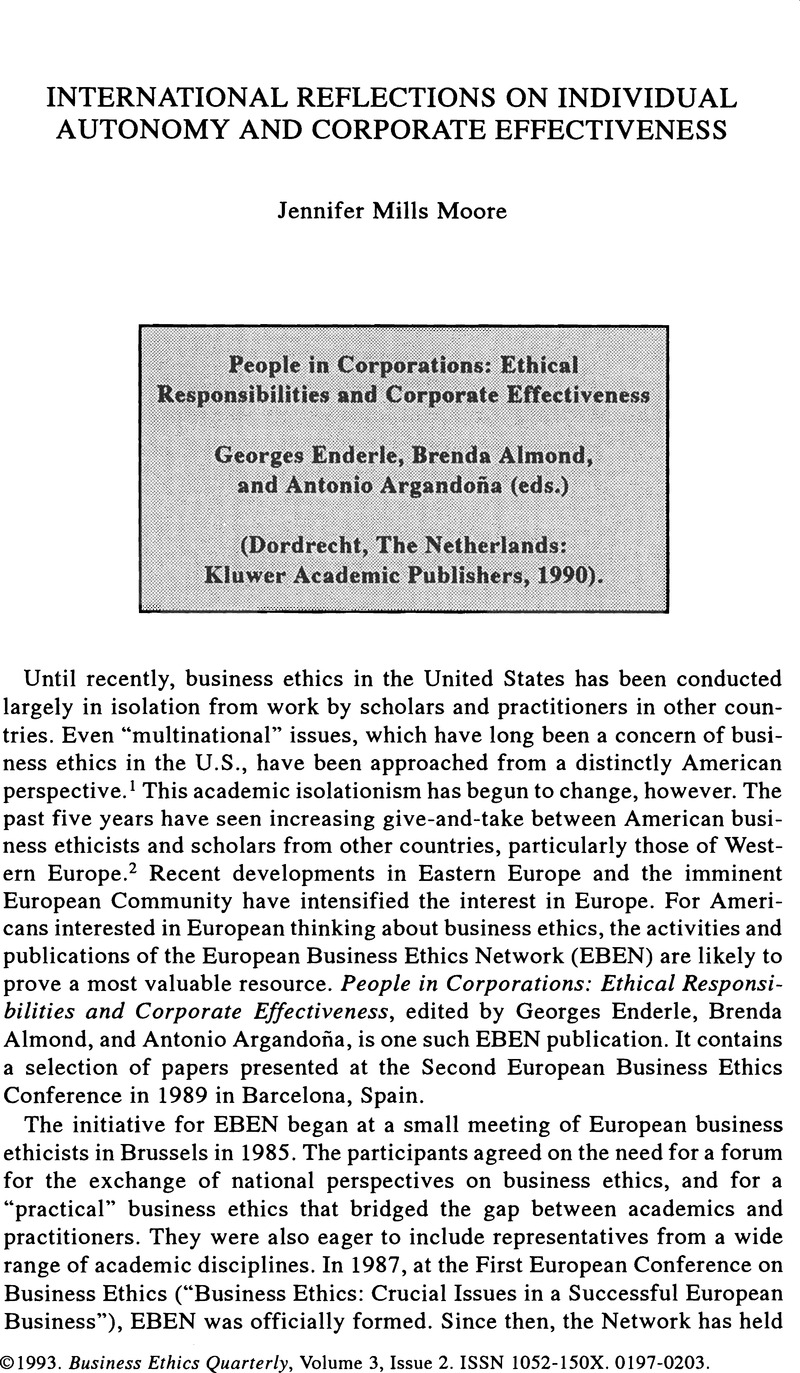Published online by Cambridge University Press: 23 January 2015

1 Much of the treatment of multinational issues, for example, reflects a preoccupation with whether U.S. companies abroad should abide by “American” ethical norms or adopt the practices of their host country, often implied to be less ethically demanding.
2 In 1989, for example, the annual Society for Business Ethics meeting included a panel of business ethicists from Italy, Great Britain, and the Netherlands, as well as an authority on Japanese business ethics.
3 Friedman’s, “The Social Responsibility of Business is to Increase its Profits” (The New York Times Magazine, September 13, 1970)Google Scholar, is a long-time staple of business ethics texts and courses.
4 The book is divided into five parts: “Personal Convictions and Corporate Claims: Ethical Conflicts and Solutions,” “‘Empowering’ People: End or Means?,” “Men and Women in Corporations: Repression, Competition or Cooperation?,” “The Ethical Role of Top Managers,” and “Outlook.” An introduction by Georges Enderle opens the volume.
5 See, for example, Peter, French, “The Corporation as a Moral Person,” American Philosophical Quarterly, 16 (1979), p. 207Google Scholar. For an alternative view, see Michael, Keeley, A Social Contract Theory of Organizations (Notre Dame: University of Notre Dame Press, 1988)Google Scholar.
6 If I am free to act as I choose, but can only “choose” one thing, then I am neither autonomous nor, consequently, morally responsible. If I “could not have done otherwise,” it makes no sense to apply moral categories to my actions. Moral agency also requires the more rudimentary ability to carry out one’s decisions, to act as one intends to act.
7 John, Ladd, “Morality and the Ideal of Rationality in Formal Organizations,” The Monist, 54 (1970), p. 488.Google Scholar
8 One response to Ladd is the argument that formal organizations can adopt ethical behavior as one of their goals. Ladd himself rejects this option, presumably because he believes that formal organizations are incapable of the reasoning necessary for selecting such goals and because ethical behavior is not the kind of end that it is possible mechanistically to pursue. In Ladd’s view, the very structure of formal organizations precludes the possibility of their moral agency. Morality can enter a corporation’s decision-making process only as a “limiting condition” of the quest for the corporate goal, for example through legislation or attention to public opinion. Ibid., p. 498.
9 Herbert, Simon, Administrative Behavior, 2d ed. (New York: Free Press, 1957)Google Scholar. The language Simon uses to describe authority in the organization makes the challenge to individual autonomy particularly clear: “A subordinate is said to accept the authority whenever he permits his behavior to be guided by the decision of a superior, without independently examining the merits of the decision.” The subordinate “holds in abeyance his own critical faculties for choosing between alternatives and uses the formal criterion of the receipt of a command or signal as his basis for choice.” Simon, , Administrative Behavior, pp. 11 and 126Google Scholar, quoted in Ladd, , “Morality and the Rationality of Formal Organizations,” p. 494.Google Scholar
10 Gorman cites David, Lewis’s “Desire as Belief,” Mind, 97 (1988), pp. 323–32Google Scholar, for proof that the “the theory that motivation may be by beliefs” is logically inconsistent with Bayesian decision theory.
11 Basions, p. 187.
12 See Jack, Mahoney, “Spheres and Limits of Ethical Responsibilities In and Of the Corporation,” p. 239Google Scholar, and Joanne, Ciulla, “On the Demand for Meaningful Work,” p. 113Google Scholar.